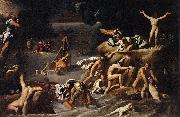Großhandels China Öl Gemälde & Rahmt Ein |
|||||||||||

|
|||||||||||
|
|
|
||||||||||||||
|
Agostino Carracci
(16 August 1557 - 22 March 1602) was an Italian painter and printmaker. He was the brother of the more famous Annibale and cousin of Lodovico Carracci. He posited the ideal in nature, and was the founder of the competing school to the more gritty (for lack of a better term) view of nature as expressed by Caravaggio. He was one of the founders of the Accademia degli Incamminati along with his brother, Annibale Carracci, and cousin, Ludovico Carracci. The academy helped propel painters of the School of Bologna to prominence. Agostino Carracci was born in Bologna, and trained at the workshop of the architect Domenico Tibaldi. Starting from 1574 he worked as a reproductive engraver, copying works of 16th century masters such as Federico Barocci, Tintoretto, Antonio Campi, Veronese and Correggio. He also produced some original prints, including two etchings. He travelled to Venice (1582, 1587 - 1589) and Parma (1586 - 1587). Together with Annibale and Ludovico he worked in Bologna on the fresco cycles in Palazzo Fava (Histories of Jason and Medea, 1584) and Palazzo Magnani (Histories of Romulus, 1590 - 1592). In 1592 he also painted the Communion of St. Jerome, now in the Pinacoteca di Bologna and considered his masterwork. From 1586 is his altarpiece of the Madonna with Child and Saints, in the National Gallery of Parma. In 1598 Carracci joined his brother Annibale in Rome, to collaborate on the decoration of the Gallery in Palazzo Farnese. From 1598 - 1600 is a triple Portrait, now in Naples, an example of genre painting. In 1600 he was called to Parma by Duke Ranuccio I Farnese to began the decoration of the Palazzo del Giardino, but he died before it was finished. Agostino's son Antonio Carracci was also a painter, and attempted to compete with his father's Academy. |
||||||||||||||
|
|
||||||||||||||
|
||||||||||||||
|
|
||||||||||||||
| Agostino Carracci
(16 August 1557 - 22 March 1602) was an Italian painter and printmaker. He was the brother of the more famous Annibale and cousin of Lodovico Carracci. He posited the ideal in nature, and was the founder of the competing school to the more gritty (for lack of a better term) view of nature as expressed by Caravaggio. He was one of the founders of the Accademia degli Incamminati along with his brother, Annibale Carracci, and cousin, Ludovico Carracci. The academy helped propel painters of the School of Bologna to prominence. Agostino Carracci was born in Bologna, and trained at the workshop of the architect Domenico Tibaldi. Starting from 1574 he worked as a reproductive engraver, copying works of 16th century masters such as Federico Barocci, Tintoretto, Antonio Campi, Veronese and Correggio. He also produced some original prints, including two etchings. He travelled to Venice (1582, 1587 - 1589) and Parma (1586 - 1587). Together with Annibale and Ludovico he worked in Bologna on the fresco cycles in Palazzo Fava (Histories of Jason and Medea, 1584) and Palazzo Magnani (Histories of Romulus, 1590 - 1592). In 1592 he also painted the Communion of St. Jerome, now in the Pinacoteca di Bologna and considered his masterwork. From 1586 is his altarpiece of the Madonna with Child and Saints, in the National Gallery of Parma. In 1598 Carracci joined his brother Annibale in Rome, to collaborate on the decoration of the Gallery in Palazzo Farnese. From 1598 - 1600 is a triple Portrait, now in Naples, an example of genre painting. In 1600 he was called to Parma by Duke Ranuccio I Farnese to began the decoration of the Palazzo del Giardino, but he died before it was finished. Agostino's son Antonio Carracci was also a painter, and attempted to compete with his father's Academy. Date 1616-1618 Medium Oil on canvas Dimensions 166 X 247 cm (65.35 X 97.24 in) cyf |
||||||||||||||
|
Related Paintings to Agostino Carracci :. |
||||||||||||||
|
|
||||||||||||||
|
|
||||||||||||||
|
KONTAKTIEREN Sie UNS |







